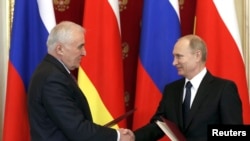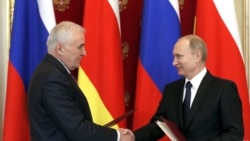Russian President Vladimir Putin recently signed an agreement on “alliance and integration” with the de facto leaders of South Ossetia, one of two Russian occupied regions of Georgia. Last year, Russia signed a similar agreement with the de facto leaders of Georgia’s other occupied region, Abkhazia.
The United States’ position on South Ossetia and Abkhazia remains clear, said U.S. State Department spokesperson Jen Psaki, “These regions are integral parts of Georgia, and we continue to support Georgia’s independence, its sovereignty, and its territorial integrity.”
The United States does not recognize the legitimacy of any agreement between the de facto leaders of Georgia’s occupied region of South Ossetia and Russia. Although Russia calls this agreement a “treaty,” neither this document nor the one signed in November 2014 with Abkhazia constitutes a valid international agreement.
Russia should fulfill all of its obligations under the 2008 ceasefire agreement, withdraw its forces to pre-conflict positions, reverse its recognition of the occupied Georgian regions of south Ossetia and Abkhazia as independent states, and provide free access for humanitarian assistance to these regions.
The U.S. continues to support the Geneva International Discussions as a means to achieving progress on security and humanitarian issues that affect the communities on the ground in Georgia. The surest way to increase trust among the parties to these discussions and to improve the lives of people on the ground would be to enhance contact across the boundary line, including for humanitarian organizations and the European Union Monitoring Mission.






